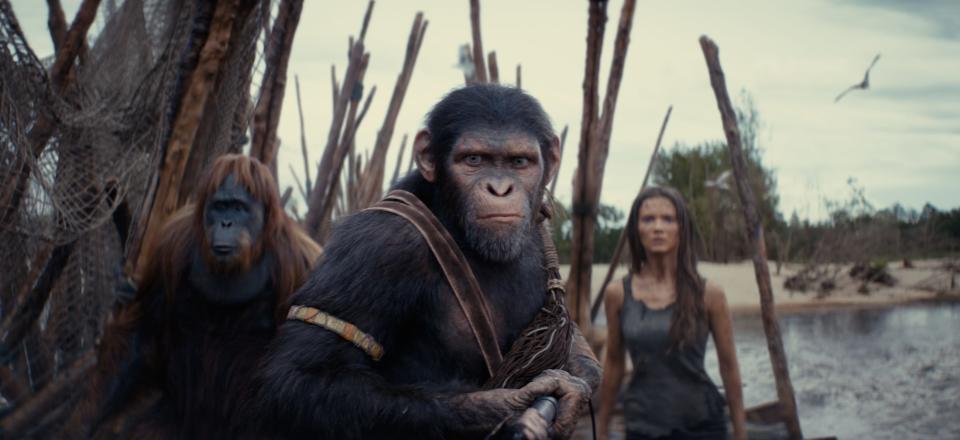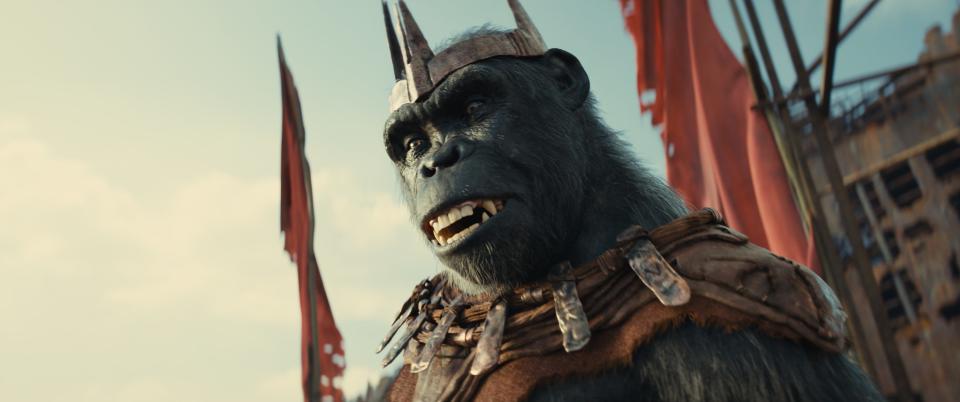Review: The simians sizzle, but story fizzles in new 'Kingdom of the Planet of the Apes'
The issue of humans and simians in existential conflict arises again in a new “Planet of the Apes,” this time with a coming-of-age sci-fi adventure that’s a piece of visually stunning world-building more thoughtful than coherent.
“Kingdom of the Planet of the Apes” (★★★ out of four; rated PG-13; in theaters now) is a sequel to the stellar “Apes” trilogy led by Andy Serkis’ iconic chimpanzee leader Caesar, set in a landscape where people have gone feral while super-smart apes rule thanks to a man-made virus. Director Wes Ball (“Maze Runner”) is a proven commodity in the post-apocalyptic space, and “Kingdom” aims to bring big ideas into a sprawling blockbuster atmosphere, though that gambit winds up weighed down by its own ambitions.

The new “Apes” is set “many generations later” after the death of Caesar, a kind and compassionate sort who believed humans and apes could one day live together. His specter looms large over “Kingdom,” which centers on a naive young chimp named Noa (played via performance capture by Owen Teague) and an Earth where nature has reclaimed the land. Noa and his friends, Anaya (Travis Jeffery) and Soona (Lydia Peckham), ready for a big day in their lives among the Eagle Clan – so called because of the birds they raise. But the peaceful existence in their village is disrupted by a brutal attack from a horde of masked apes, who burn Noa’s home and leave him for dead.
Noa wakes, battered and vowing to save his friends and family who’ve been taken, and he first falls in with Raka (Peter Macon), a wise orangutan who lives by Caesar’s idealistic beliefs. They meet a young human named Mae (Freya Allan), who’s at first distrustful of her new allies until they save her from the same big bad apes that torched Noa’s village.
The trio learns these villains are goons for the tyrannical bonobo Proximus Caesar (Kevin Durand). Ruling a coastal kingdom of apes, Proximus has taken Caesar’s name yet twists his words to force his prisoners to crack a large vault and plumb the mysterious human treasures within. He’s both a fan of mankind and a symbol of our innate cruelty in ape form.

Just like the previous films, the main draw is the apes themselves, computer-generated simian wonders who immerse audiences into their world. They look better than ever, with Noa’s tearful eyes delivering so much fragility and emotion in a close-up after a tragic scene, and the performance-capture wizardry, a signature aspect of these new "Apes" movies, feels more groundbreaking than ever.
At the same time, none of the major players in "Kingdom" reach the same level of acting or personality as Serkis’ Caesar. That is an extremely high bar, though, and there are some pretty great apes: Teague's Noa grows on you because of his plight while Macon makes Raka a scene-stealing hoot with a kind soul. Allan, a regular on Netflix’s “The Witcher,” also shines in a meaty role as a human who’s more complicated than she appears.
The early “Apes” movies from the ‘60s and '70s were defined by genre innovation and shock endings, and the Caesar movies were simply a great tale well told. “Kingdom” is less confident in its storytelling: It explores themes of legacy and species coexistence with a metaphor-laden plot that feels too long at 2½ hours, and it begs for more exposition at the beginning before overdoing it later on. The movie ultimately does satisfy by its end, even as it emphasizes philosophy and message over logical narrative choices.
“Kingdom” checks most of the boxes for longtime “Apes” fans, and newbies don’t need to any prior homework as a standalone story that mostly explains itself. And as humans, you do commiserate with the onscreen apes themselves, because everything felt a little better back when Caesar was around.
This article originally appeared on USA TODAY: 'Kingdom of the Planet of the Apes' review: Simians sizzle in new film


